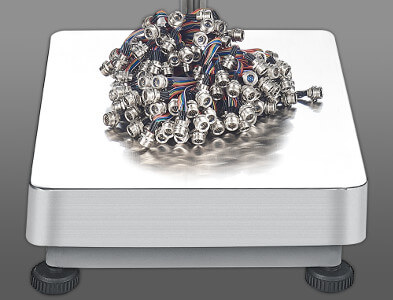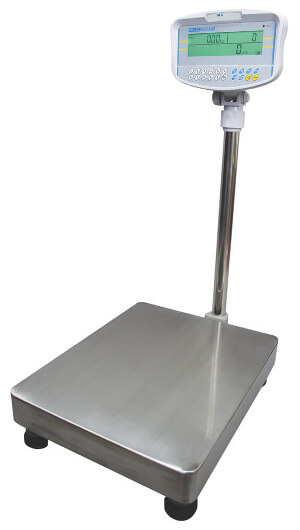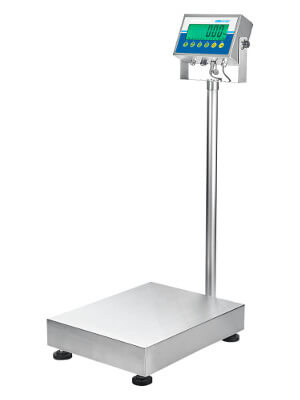
If you need a floor scale, this guide will help you understand floor scales, their main features and what to look for when purchasing one.
What is a Floor Scale?
Floor scales are weighing scales with readabilities that approximately start around 0.01lb / 0.005kg and capacities that can range between165lb / 75kg and 1320lb / 600kg. They usually feature a large platform and are used on the floor, hence the name. They’re the step between a bench scale and a platform scale. They’re less precise and compact than bench scales but have a much higher capacity without sacrificing too much precision. If you need heavy-duty weighing under a ton, a floor scale is a good idea.
Most floor scales offer an indicator on a pillar attached to a stainless steel platform. They’re very versatile, with features that often include counting and checkweighing. Some floor scales even include integrated label printers or percentage weighing. Users can operate one device to do multiple tasks, saving on costs, space and training time. Floor scales are designed to withstand industrial demands, so they feature sturdy, easy-to-clean construction. Rubber feet help the scales stay stable in demanding conditions.

Why Use a Floor Scale?
Floor scales offer a combination of high capacity and mid-grade readability that makes them well-suited for industrial tasks like manufacturing, batching, processing, sorting, shipping, packaging and more.
They’re packed with features designed to speed up repetitive tasks for weighing and counting large quantities. They’re more precise than platform scales and easier to maneuver as needed. A floor scale is a reliable weighing solution for demanding environments. Floor scales can accurately measure bulk quantities and are often used to sort and reduce materials before processing or packaging.
In addition to industrial tasks, floor scales are sometimes used by zoos and veterinarians to weigh large animals like big cats.
Floor scales can save a lot of time and money. They’re frequently used to weigh freight and luggage, where a few kilos can be costly. By accurately weighing large quantities, users can improve their operating procedures and prevent waste. It can also help when mixing large quantities of ingredients or chemicals, as it ensures that the products remain consistent even when their production is scaled up.

The Right Indicator
Be sure to consider the indicator when purchasing a floor scale! If you do a lot of manual sample entry, it’s worth investing in a full numeric keypad. Most floor scales with a counting function feature a numeric keypad, so they’re a good place to start if you need one. If you do a lot of sorting, a checkweighing indicator with bright lights and audible alarms can speed up tasks considerably.
When weighing raw or wet ingredients, you might want to consider a stainless steel indicator like our AE 403 that won’t get damaged by spills or dust. Ideally, the indicator should reflect the tasks you’ll be doing most often and simplify them. Some indicators have users scroll through results, while others can show multiple results on the same screen. While floor scales usually have the indicator mounted on a pillar, users can also put them on a wall bracket for viewing results on vertical surfaces. That can be very useful for sorting and verification tasks, remote operation or weighing bulky objects.

Integration
While floor scales might not fit on desks or counters, they can still be integrated to systems via their standard RS-232 interface. Be sure to select a model with data communication compatible with your systems and consider connectivity when choosing a location for the scale.
If you’re using a label printing floor scale like our BKT or BCT, try to set them in locations where the labels can quickly be affixed to boxes after weighing.

Operation
The right floor scales should have a quick stabilization time and speedy results. Make sure the indicator clearly shows the results you need, even in bright lights or dark corners. A good floor scale should be intuitive and easy to use with little to no training and able to repeat heavy-duty weighing tasks to optimize productivity. Some models include dynamic weighing, which allows users to weigh animals or moving liquids such as concrete, dough or chemicals.
If you weigh items in the same containers frequently, consider getting a floor scale with a preset tare. This can considerably reduce the need for manual taring. If you frequently work in uneven areas, we recommend getting a scale with adjustable feet like our GFC floor counting scales for stable results.
For users who need to manually record a lot of information between weighings, a hold function freezes the weight on the display even if the package is taken off.
Floor scales can be moved, but they usually don’t have wheels, so be prepared to lift them if you must change their location. If you need to move the scale or have to use it in different job sites, make sure the scale can function using a rechargeable battery for work in areas without power.

Some Tips to Ensure a Long-Lasting Floor Scale
- When placing the scale, always check the cables are linked and not damaged or crushed by equipment, as they could damage the connection.
- Do not drag the scale when you move it.
- Be gentle when cleaning the platform and indicator.
- While they are sturdy, not all floor scales are protected against water ingress. If you need to wash a scale with water at high pressure, make sure your scale is washdown and rated at least IP67, like our Gladiator.
- It’s important to frequently clean and calibrate your scale, as debris and daily usage could take a toll on its precision after a while.
Accessories
Combine floor scales with specialized accessories to make them even more versatile and better suited to your needs. A relay box and a light tower can make checkweighing easier in noisy or dimly-lit environments, with limits brightly visible, while a roller deck can be helpful if the scale is in a conveyor line in shipping or assembly. Floor scales can also be connected to printers and software for record-keeping and system management. Remember that floor scales do not have integrated ramps, so be sure to buy some if you need to get heavy items on the scales from the floor.
Solid, flexible and reliable, floor scales are some of the most commonly used weighing devices. It’s worth spending a little time looking for the best features to ensure a weighing experience tailored to your needs.
If you want to learn more about floor scales or would like to discuss the best option for your business, please contact us. We’ll be happy to help you understand all your options.

